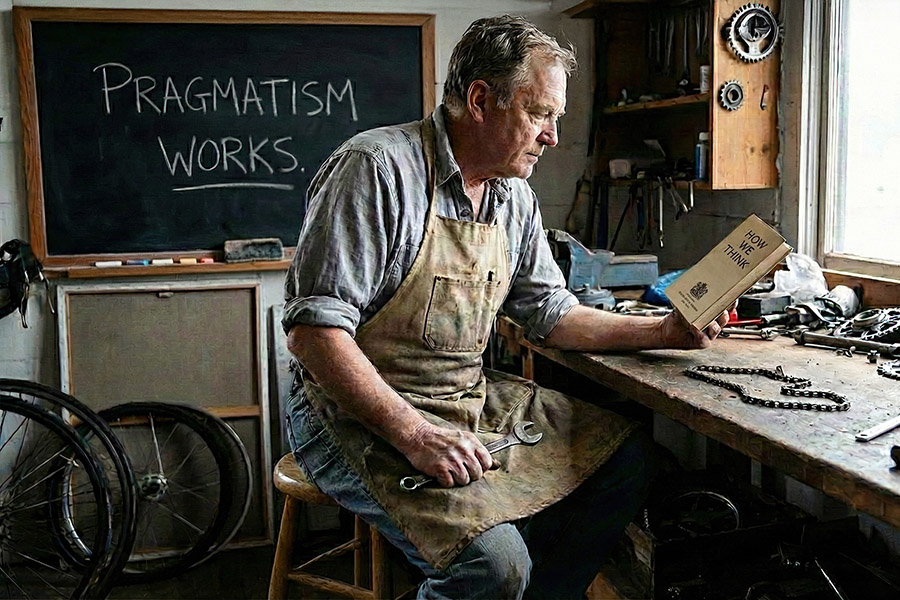
Preface
This website is a philosophical enquiry about belief, truth and pragmatism.
Much of what is written here is motivated by the idea that very often it is much more important to understand the justifications, coherence, motivations and consequences of our beliefs rather than be over-concerned about whether or not they are definitively or absolutely true or false. I am presently convinced that what we believe about everyday experience and the natural sciences is a good basis for a pragmatic philosophical outlook.
Being sincere and honest about what we observe and believe should not be confused with the more abstract idea of ‘Truth’. I claim that, although the idealised concept of ‘Truth’ is both logically important and useful, the ways in which we justify our beliefs to ourselves and others are much more significant. We are error prone or fallible animals whose ideas are likely to be revised or elaborated upon by future generations. Our fallibility affects our pursuit of the sciences and other systematic studies as much as our response to and interpretations of everyday experience. In addition, our understanding of the world and ourselves is both informed and limited by our place in the history of human cultural development.
From a philosophical perspective, I adopt what is called a deflationist explanation of Truth. When we have sincerely and honestly asserted what is the case (or at least believe to be the case), the deflationist accepts that claims of truthfulness are no more than a statement of what we accept (or agree with). If you say to a friend, “Yes, that is true”, you are signalling your agreement not claiming that you and your friend have formulated an idea that will be accepted and pursued until our species has gone.
I take the view that important beliefs are those which make a difference to our understanding of the world, affect the way we conduct our lives, and improve our personal and communal well-being. This outlook is known as pragmatism.
Wikipedia describes pragmatism as:
“a philosophical tradition that views language and thought as tools for prediction, problem solving, and action, rather than describing, representing, or mirroring reality. Pragmatists contend that most philosophical topics—such as the nature of knowledge, language, concepts, meaning, belief, and science—are all best viewed in terms of their practical uses and successes”
The overall philosophical stance I have adopted could be described in philosophical jargon as a form of neo-pragmatism, incorporating a coherence theory of justification. Coherence theorists stress that ideas are more acceptable when they reinforce each other and fit together. In addition, I also accept the importance of sensory experience in formulating our philosophy. I see our senses and our methods of enquiry as fundamental to the way we live and develop our culture, rather than foundational in the classic sense used in traditional epistemology.
It seems to me that the most that we can hope for concerning our explanations of the world are that they are rooted in observation, are coherent and useful, are at least weakly predictive, and are not personally or communally-held delusions. Although the concept of knowledge (of the world) as justified true belief has ancient origins, as a pragmatist, I feel that we are better concentrating the concept of justified belief. In this way of thinking theoretical emphasis is placed on the justification of ideas rather than untenable explanations of ‘Truth’. It is almost stating the obvious to say that a belief that is not justified could either be true or false. This way of looking at the use of the word ‘true’ is called deflationism. Of course there is always the possibility of partial truth or limited accuracy rather than the unsophisticated binary (choice) ways of thinking that has bedeviled epistemology. The reasons for adopting this philosophical stance are really quite simple: I feel that we need to see ourselves as fallible or prone to error. In other words, our explanations are dependent on creative acts of imagination that others might have good reason to reject either now or in the future.
In our philosophical explorations, I feel strongly that we should have regard to everyday experience, the nature of language, the structure of logic, and enlightening systematic studies of all kinds including (but not limited to) science, its applications such as medicine and engineering, the philosophy of science, and more general philosophical scholarship.
Steve Campbell, September 2024
Next: List of Contents >